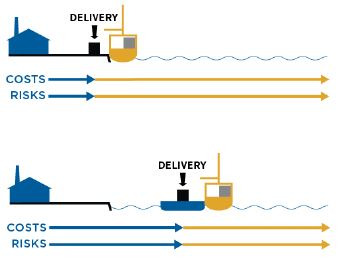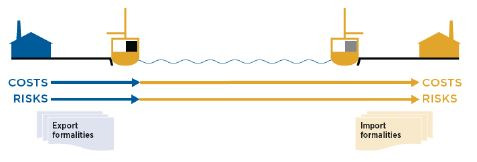무역학 관련 대학 리포트에서 가장 많이 활용되는 Incoterms 2020의 영어 원본 및 한국어 번역을 아래와 같이 제공합니다. 번역 프로그램 번역보다 실무에서 사용되는 단어를 사용하였습니다. FAS, FOB의 영어 원본 및 한국어 번역하였습니다.
FAS | Free Alongside Ship(선측 인도 규칙)

1. Delivery and risk—“Free Alongside Ship” means that the seller delivers the goods to the buyer
• when the goods are placed alongside the ship (e.g. on a quay or a barge)
• nominated by the buyer
• at the named port of shipment
• or when the seller procures goods already so delivered.
The risk of loss of or damage to the goods transfers when the goods are alongside the ship, and the buyer bears all costs from that moment onwards.
1. 인도와 위험 - “선측인도”는 다음과 같이 된 때 매도인이 물품을 매수인에게 인도하는 것을 의미한다.
• 지정선적항에서
• 매수인이 지정한 선박의
• 선측에 (예컨대 부두 또는 바지(barge)에) 물품이 놓인 때 또는 이미 그렇게 인도된 물품을 조달한 때.
• 물품의 멸실 또는 훼손의 위험은 물품이 선측에 놓인 때 이전하고, 매수인은 그 순간부터 향후의 모든 비용을 부담한다.

2. Mode of transport—This rule is to be used only for sea or inland waterway transport where the parties intend to deliver the goods by placing the goods alongside a vessel. Thus, the FAS rule is not appropriate where goods are handed over to the carrier before they are alongside the vessel, for example where goods are handed over to a carrier at a container terminal. Where this is the case, parties should consider using the FCA rule rather than the FAS rule.
2. 운송방식 – 본 규칙은 당사자들이 물품을 선측에 둠으로써 인도하기로 하는 해상운송이나 내수로운송에만 사용되어야 한다. 따라서 FAS 규칙은 물품이 선측에 놓이기 전에 운송인에게 교부되는 경우, 예컨대 물품이 컨테이너터미널에서 운송인에게 교부되는 경우에는 적절하지 않다. 이러한 경우에 당사자들은 FAS 규칙 대신에 FCA 규칙을 사용하는 것을 고려하여야 한다.

3. Identifying the loading point precisely—The parties are well advised to specify as clearly as possible the loading point at the named port of shipment where the goods are to be transferred from the quay or barge to the ship, as the costs and risks to that point are for the account of the seller and these costs and associated handling charges may vary according to the practice of the port.
3. 정확한 적재지점 지정 – 당사자들은 지정선적항에서 물품이 부두와 바지(barge)로부터 선박으로 이동하는 적재지점을 가급적 명확하게 명시하는 것이 좋다. 그 지점까지의 비용과 위험은 매도인이 부담하고, 이러한 비용과 그와 관련된 처리비용(handling charges)은 항구의 관행에 따라 다르기 때문이다.
4. ‘or procuring the goods so delivered’—The seller is required either to deliver the goods alongside the ship or to procure goods already so delivered for shipment. The reference to “procure” here caters for multiple sales down a chain (string sales), particularly common in the commodity trades.
4. ‘또는 그렇게 인도된 물품을 조달함’ - 매도인은 물품을 선측에서 인도하거나 선적을 위하여 이미 그렇게 인도된 물품을 조달하여야 한다. 여기에 “조달한다”(procure)고 규정한 것은 특히 일차산품거래(commodity trades)에서 일반적인 수차에 걸쳐 연속적으로 이루어지는 매매(‘연속매매’, ‘string sales’)에 대응하기 위함이다.
5. Export/import clearance—FAS requires the seller to clear the goods for export, where applicable. However, the seller has no obligation to clear the goods for import or for transit through third countries,
5. 수출/수입통관 – FAS에서는 해당되는 경우에 매도인이 물품의 수출통관을 하여야 한다. 그러나 매도인은 물품의 수입을 위한 또는 제3국 통과를 위한 통관을 하거나 수입관세를 납부하거나 수입통관절차를 수행할 의무가 없다.

FOB | Free On Board(본선 인도 규칙)

1. Delivery and risk—“Free on Board” means that the seller delivers the goods to the buyer
• on board the vessel
• nominated by the buyer
• at the named port of shipment
• or procures the goods already so delivered.
1. 인도와 위험 - “본선인도”는 매도인이 다음과 같이 물품을 매수인에게 인도하는 것을 의미한다.
• 지정선적항에서
• 매수인이 지정한
• 선박에 적재함
• 또는 이미 그렇게 인도된 물품을 조달함.

The risk of loss of or damage to the goods transfers when the goods are on board the vessel, and the buyer bears all costs from that moment onwards.
물품의 멸실 또는 훼손의 위험은 물품이 선박에 적재된 때 이전하고, 매수인은 그 순간부터 향후의 모든 비용을 부담한다.
2. Mode of transport—This rule is to be used only for sea or inland waterway transport where the parties intend to deliver the goods by placing the goods on board a vessel. Thus, the FOB rule is not appropriate where goods are handed over to the carrier before they are on board the vessel, for example where goods are handed over to a carrier at a container terminal. Where this is the case, parties should consider using the FCA rule rather than the FOB rule.
2. 운송방식 – 본 규칙은 당사자들이 물품을 선박에 적재함으로써 인도하기로 하는 해상운송이나 내수로운송에만 사용되어야 한다. 따라서 FOB 규칙은 물품이 선박에 적재되기 전에 운송인에게 교부되는 경우, 예컨대 물품이 컨테이너터미널에서 운송인에게 교부되는 경우에는 적절하지 않다. 이러한 경우에 당사자들은 FOB 규칙 대신에 FCA 규칙을 사용하는 것을 고려하여야 한다.

3. ‘or procuring the goods so delivered’—The seller is required either to deliver the goods on board the vessel or to procure goods already so delivered for shipment. The reference to “procure” here caters for multiple sales down a chain (string sales), particularly common in the commodity trades.
3. ‘또는 그렇게 인도된 물품을 조달함’ - 매도인은 물품을 선박에 적재하여 인도하거나 선적을 위하여 이미 그렇게 인도된 물품을 조달하여야 한다. 여기에 “조달한다”(procure)고 규정한 것은 특히 일차산품거래(commodity trades)에서 일반적인 수차에 걸쳐 연속적으로 이루어지는 매매(‘연속매매’, ‘string sales’)에 대응하기 위함이다.
4. Export/import clearance—FOB requires the seller to clear the goods for export, where applicable. However, the seller has no obligation to clear the goods for import or for transit through third countries, to pay any import duty or to carry out any import customs formalities.
4. 수출/수입통관 – FOB에서는 해당되는 경우에 매도인이 물품의 수출통관을 하여야 한다. 그러나 매도인은 물품의 수입을 위한 또는 제3국 통과를 위한 통관을 하거나 수입관세를 납부하거나 수입통관절차를 수행할 의무가 없다.

* 참고사항
FOB의 변형 조건으로 FOB STOWED를 의미한다. 일반적으로 개품 화물보다는 특수화물이나 BULK 화물에 많이 사용되는 조건이다.
화물을 본선 상에 선적하는 비용뿐만 아니라 청소비용, 화물정리 비용 등에 대한 부담도 Seller가 하는 조건이다.
즉, FOB는 매도인의 비용분기점이 본선의 갑판이지만, FOB ST는 본선 상에 화물을 안전하게 장치하고 선내에서 발생되는 청소비용, 화물정리 비용도 수출자가 부담하는 조건이다.
'상법, 세법, 정책' 카테고리의 다른 글
| 등기사항증명서 열람 및 발급 신청_Ver1.0 (0) | 2025.03.11 |
|---|---|
| Incoterms 2020 영어 원본 및 한국어 번역(CFR, CIF) (0) | 2025.03.06 |
| Incoterms 2020 영어 원본 및 한국어 번역(DAP, DPU, DDP)_Ver1.0 (0) | 2025.02.28 |
| Incoterms 2020 영어 원본 및 한국어 번역(CPT, CIP)_Ver1.0 (1) | 2025.02.27 |
| Incoterms 2020 영어 원본 및 한국어 번역(EXW, FCA)_Ver1.0 (0) | 2025.02.27 |



